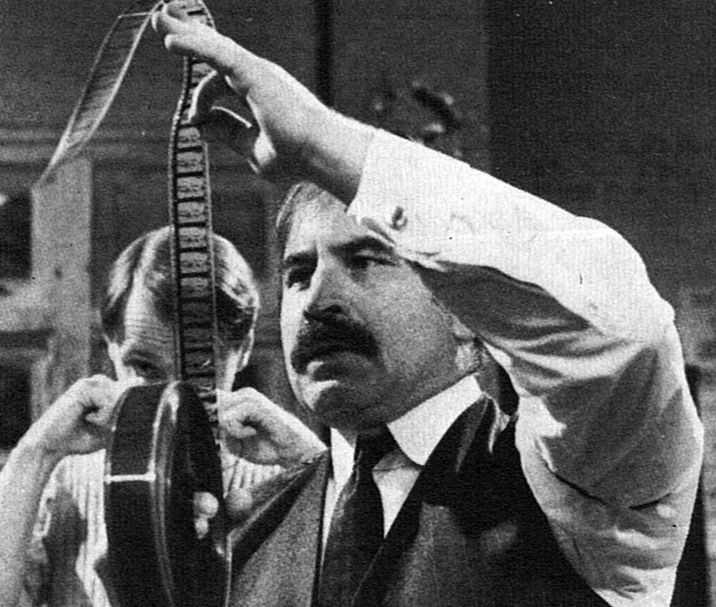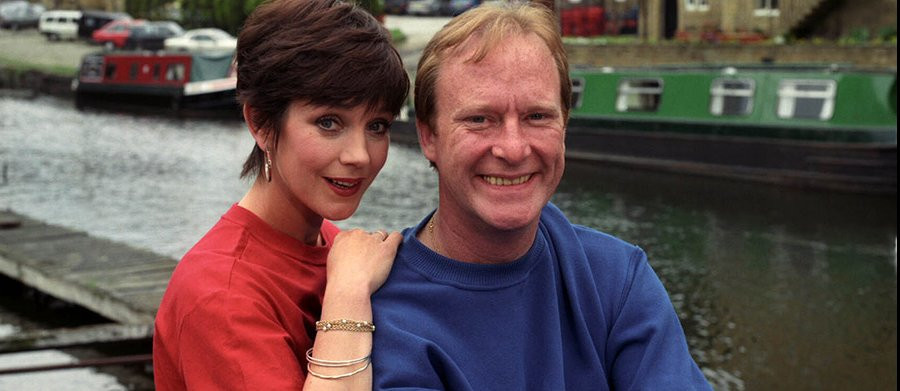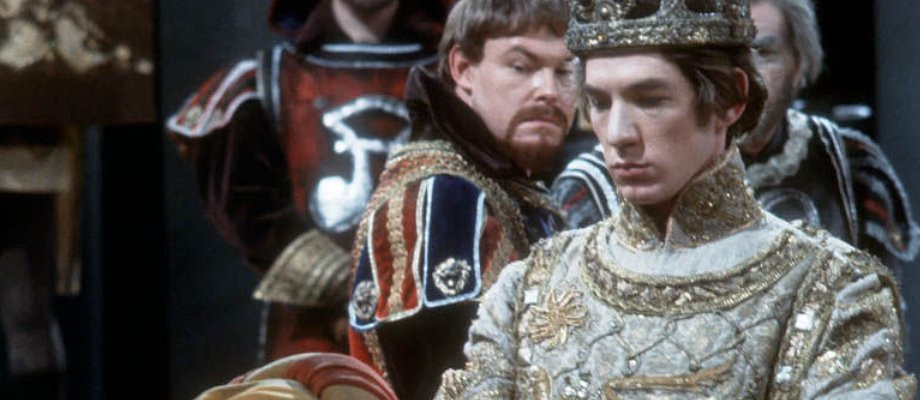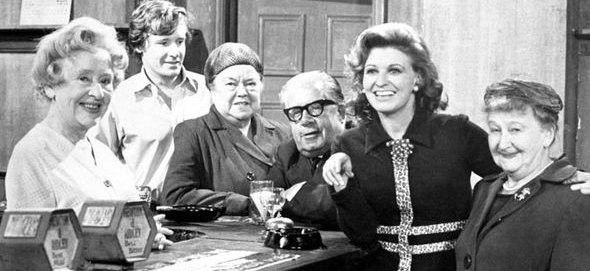
Leonard Rossiter
‘at the end of it (Rising Damp), the man was absolutely exhausted…he would be so wound up…you felt the top of his head was going to blow off.’
Leonard Rossiter biography by Brian Slade
There are plenty of memorable comedy characters embedded in the memories of the 1970s – Basil Fawlty, Frank Spencer, Norman Stanley Fletcher as examples – but few actors can have been as proficient in delivering small screen legends as Leonard Rossiter.
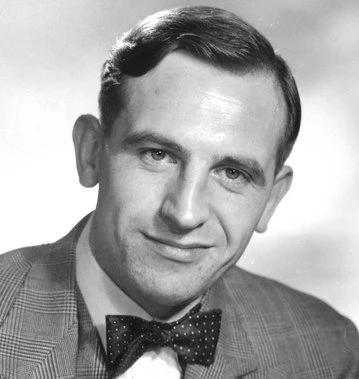
Acting was not a vocation Leonard Rossiter was born into. The son of a barber shop owner (though Rossiter said his father was more of a bookmaker than a barber), Leonard went into the insurance business after the Second World War. He had planned to take up a language scholarship studying French and German, but his father was killed in 1942 and so he felt it was more important to earn a living at home. He worked in the claims department for seven years.
Leonard became interested in amateur theatre via a young lady friend. When she was rehearsing late one night, he went inside when collecting her and was not impressed with what he saw, recalling, ‘One night I sat in the back and watched them rehearse and I must have made some acid comment, so she issues a challenge that I should try myself.’ It was one of those ‘the rest is history’ moments as he became consumed by the theatre and everything it had to offer.
For many years Leonard would perform in theatre and he already had an impressively lengthy CV by the time he went into two years at the Bristol Old Vic in 1960. By the time he left he had a reputation for being one to watch and rather than return home, he set up in London. Acting jobs on stage and screen would see him in regular demand, even if not so much for that breakthrough role that he still sought.

In 1967 however, a stage role would prove to be just that event that would open the world’s eyes to the talents of Leonard Rossiter. He took the leading role in Bertold Brecht’s The Resistible Rise of Arturo Ui in Glasgow and at the Edinburgh Fringe Festival. It earned him rave reviews in its first few years before it arrived at the Saville Theatre on the West End in 1969. Rossiter would consider this to be the key role to future success.
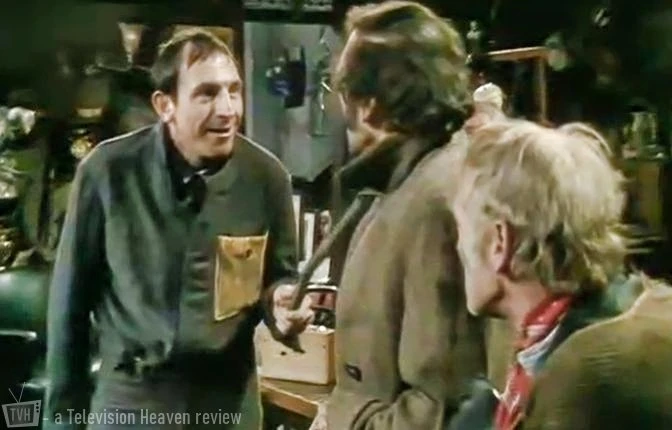
Television roles came and went…Z Cars in 1963 gave him work for eight episodes as Detective Inspector Bamber and a year later he would make the first of two appearances in Steptoe and Son, this as a dodgy art dealer. However, at this point he was still relying on bit part roles alongside his theatre work. By the time he appeared in the show again, this time in 1972’s episode The Desperate Hours as a disgruntled escaped convict on the run with his older partner in crime, his reputation had grown and producers were watching.
Among those watching was David Croft, one half of the comedy geniuses who had brought Dad’s Army to the screen. They were looking for somebody who could take on the challenge of Sergeant Major ‘Shut Up’ Williams in their new show, It Ain’t Half Hot Mum. Despite Rossiter being brought in to chat with Croft and co-creator Jimmy Perry, the meeting was a very quick disaster, Croft considering Rossiter to have, ‘…a bigger ego than I was prepared to deal with…I could visualise endless rewrites to satisfy him.’ The failure to land the part, or indeed get much further than the lift at the BBC, did neither party any harm. Windsor Davies would get his career defining role with Croft and Perry, while Rossiter would be courted by Eric Chappell, who saw Leonard’s performance in Steptoe and Son and thought, ‘Such a powerful figure, I thought he’d be a wonderful Rigsby.’
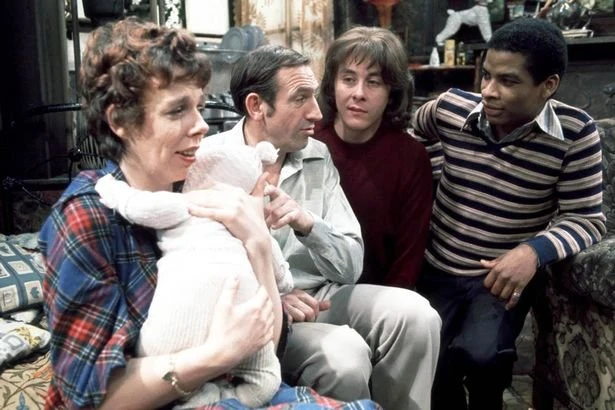
The Rigsby of which he spoke was Rupert Risgby, a stuck-up discriminatory landlord who finds himself hosting a suave, popular, intelligent and sophisticated black man as one of his tenants. He was initially presented on stage in The Banana Box as Rooksby, and when Yorkshire Television saw its potential for the small screen, Rossiter continued in the role as Rising Damp arrived on our screens in 1974.
Rising Damp was a runaway success. Existing tenants in Rigsby’s poor quality housing were medical student Alan (Richard Beckinsale) and Ruth Jones (Frances de la Tour). Jones was the object of Rigsby’s affections, something he was completely hopeless in pursuing, and the arrival of another student, Phillip Smith (Don Warrington), attracts Jones’s attention far more than the seedy landlord.
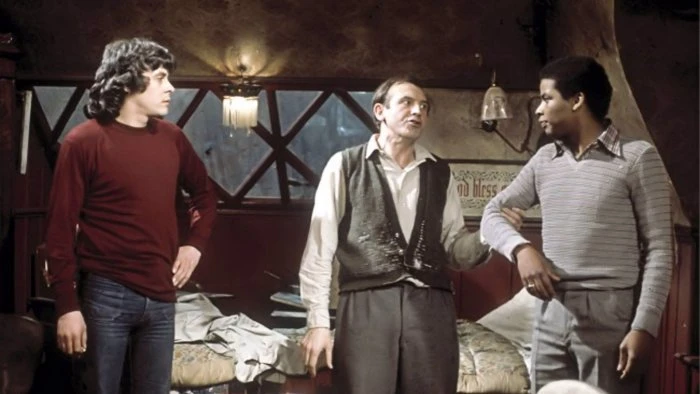
Rising Damp was not as blatantly racist as some other shows of its time…Rigsby himself somewhat admires Smith and after initial misgivings accepts him as someone who has the qualities that he himself desires. However, Rising Damp propelling Rossiter to primetime stardom wasn’t without its challenges. Rossiter was a perfectionist and everything and everybody within the shows in which he was appearing had to be perfect. His wife Gillian recalled that, ‘Leonard only ever got irritated with people who he didn’t think were pulling their own weight.’ His demanding reputation and intense competitiveness would follow him throughout his career. One of the reasons Rising Damp worked was Beckinsale’s more calming nature. Rossiter adored Beckinsale and Warrington felt that his mood lifted whenever the pair were together.
Beckinsale’s relaxed nature was a polar opposite to Rossiter’s frenetic energy. Warrington recalled the intense effort that Leonard would put into every performance, remembering, ‘at the end of it, the man was absolutely exhausted…he would be so wound up…you felt the top of his head was going to blow off.’ In his own diary, pal Gyles Brandreth echoed those thoughts, commenting that, ‘He crackles with tension: his nervous energy is alarming.’

Mirroring Beckinsale’s success in juggling two primetime comedy successes in parallel, Beckinsale also appearing in Porridge at the time, Rossiter’s next major role was in the television adaptation of the David Nobbs series of books, The Fall and Rise of Reginald Perrin. Perrin is a sales executive suffering an acute mid-life crisis and across three series, his behaviour is increasingly extreme and erratic as society gets the better of him. A darker role than Rigsby, it was nonetheless another feather in Rossiter’s cap.
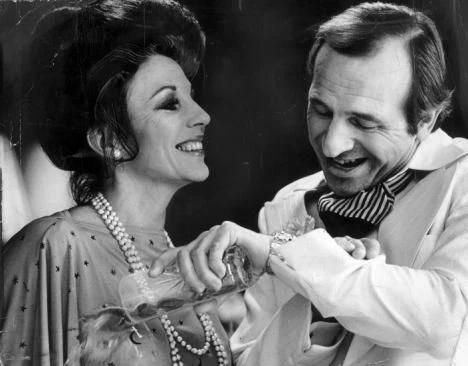
Despite having two successful sitcoms on the go, many people remember Rossiter as much for his commercials as his television roles. For six years he appeared in an array of adverts for Cinzano, with his wife played by Joan Collins. On each occasion, the pretentious jittery role played by Rossiter would always stumble into a way of espousing the merits of the drink before spilling his wife’s one all over her. The ads were an absurdly successful series and Collins would later recall of Rossiter that despite his reputation, ‘I never found him demanding with anyone other than himself.’
Theatre was where Rossiter found himself most comfortable. He felt that screen work while all well and good allowed more room for the director to be in control, believing that an actor has more control on stage. In 1984 Rossiter was back on stage in fine form in Loot. Gyles Brandreth ominously noted within his glowing praise that Rossiter was, ‘completely brilliant, but he was sweating profusely from start to finish: Michele [Brandreth] said, “he’s desperately ill.”’
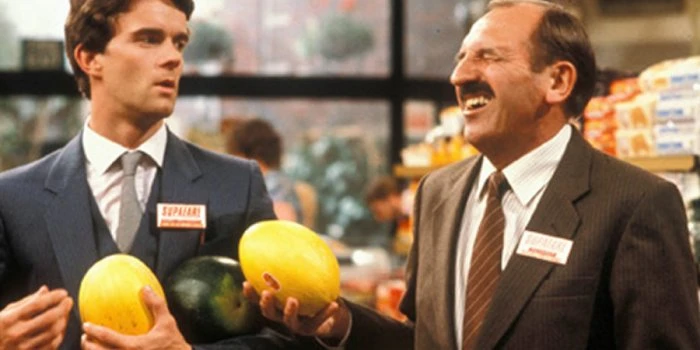
A few weeks later, Rossiter was gone. He failed to take his cue in a performance and he was found unresponsive in his dressing room, attempts to revive him failing. A man who was relentlessly playing squash as many as three times a day had died of a massive heart attack at just 57 years of age. British audiences would see him one more time in Trippers Day, a decidedly lighter sitcom effort that seemed well below his talents. While not a complete disaster, the somewhat weaker cast around him didn’t help the ill-fated show and is not remembered by many as being his swansong.
Leonard Rossiter carried a reputation of being difficult, but he was most demanding of himself. His distinctive voice and facial features made him one of the most well know personalities on television, despite seemingly being uncomfortable with interviews and his public. Don Warrington recalled years after Rossiter’s passing that, ‘He didn’t get the recognition that he felt he deserved…he was really a master craftsman.’ Few could argue with that.
Published on March 24th, 2022. Written by Brian Slade for Television Heaven.




